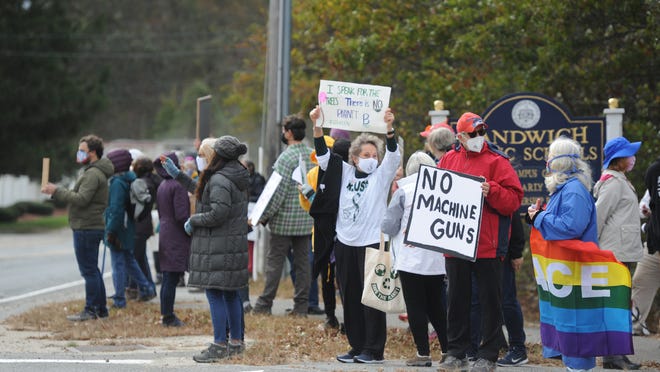Federal pols weigh in on proposed machine-gun range

JOINT BASE CAPE COD — With plans set to move forward with a proposed multipurpose machine-gun range, members of the state’s Congressional delegation echoed the concerns of the community and environmental organizations in a joint letter late last week.
U.S. Sens. Edward Markey and Elizabeth Warren and U.S. Rep. William Keating shared their concerns in a letter sent to the Massachusetts Army National Guard on Friday, and requested additional action prior to construction of the proposed gun range at Camp Edwards.

In response, members of Joint Base Cape Cod spoke out on the stringent measures taken to ensure the multipurpose gun range is environmentally safe.
“Not only are we training here, but most of us live around here and don’t want to contaminate the environment or the drinking water,” Maj. Alexander McDonough, Plans, Training, Mobilization and Security Officer for Joint Base Cape Cod, said when reached by phone Wednesday.
'Finding of no significant impact'
In 2015, the National Guard was awarded a military construction project to build the multipurpose range. The approximately $11.5 million project consists of $9.7 million for range construction and $1.8 million for targetry.
The National Guard Bureau, a federal agency that oversees all state militias, plans in the coming days to declare a “finding of no significant impact.”
Once the National Guard gives its final approval, the range is certified under the National Environmental Policy Act. The proposed plan will then go to the Massachusetts Environmental Management Commission, which will vote on whether to approve the plan.
More:National Guard finds proposed gun range wouldn't impact environment
Since the public became aware of the project last summer, congressional legislators have received numerous correspondence from residents expressing their concerns over the impact of the proposed gun range on the environment and surrounding communities, the letter said.

“We believe in the mission of the Guard, and we also agree with our constituents that our State & Federal government has an obligation to take all possible care in determining any potential impacts that the construction of this range may incur – even if that means going above and beyond what is required by the statute,” the letter said.
The National Guard’s proposal for the machine-gun training range calls for clearing 170 acres of forest and disturbing about 199 acres of land.
Although 170 acres sounds like a lot, it is only 1.2% of the overall property at the base, said retired Brig. Gen. Christopher Faux, executive director of Joint Base Cape Cod.
By allowing the gun range to be installed, he said, funding also is provided to the park rangers who help maintain and sustain the scrub pine forest located on the base. Also, he said, the majority of the footprint of the proposed gun range will be going back to managed habitat.
“Sometimes you've got to cut down a tree to save a forest,” Faux said.
More than 5,000 acres would be required to accommodate the operation, since it would include the area where projectiles fired on the range would land.
“If this range wasn’t viable (the environmental agencies) would have stopped us,” McDonough said. “We are not in the business of building a range that is unsustainable. We are in the business of building a sustainable range that meets the soldier's needs and the environmental ones.”
Over the past five years, the National Guard has coordinated with multiple state and federal agencies to ensure that adverse impacts to natural resources, including state-listed rare species, were avoided or mitigated.
Mitigation for the project will be on a 4 to 1 ratio, with 4 acres of mitigation for every acre affected. A direct transfer of 260 acres of land will be given to the Crane Wildlife Management area, which abuts the base.
A formal environmental review of the project began in May 2019 and was conducted under both the National Environmental Policy Act and the Massachusetts Environmental Policy Act.
The MEPA process was completed in July 2020 when the Massachusetts National Guard received a certificate from the department that shows the submitted project adequately and properly complies with the state’s regulations.
The range would be used for training of military personnel and weapons qualification. Trainees would travel to the base from around Massachusetts and surrounding states.
The gun range will best suit the needs of the military if it is located on the base because many soldiers are struggling to meet the annual qualifications, McDonough said. Currently, soldiers have to travel long distances during their few training weekends a year to meet this annual requirement, he said.
To do all of that travel on top of the training is almost impossible, Faux said.
JBCC environmental concerns
Joint Base Cape Cod is more than just an essential part of the Cape Cod community and a driver of the local economy, the letter from the legislators said, it is also atop the sole aquifer on Cape Cod.

“For too long, activities on the land now known as JBCC did not take environmental impact into account,” the letter said. However, the base has evolved over the years into a model for renewable and environmentally sensitive defense installations, the letter continued.
Since the cleanup of the base began, there has been ongoing dialogue and collaboration between the base, local officials and environmental groups to ensure that training activities protect Cape Cod’s water supply, the letter stated.
“That collaboration must continue to ensure that the greater Cape Cod community continues to support the base,” the letter said.

No comments:
Post a Comment
Note: Only a member of this blog may post a comment.